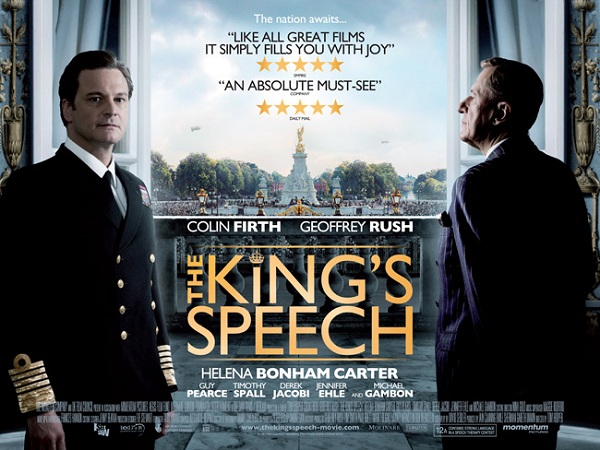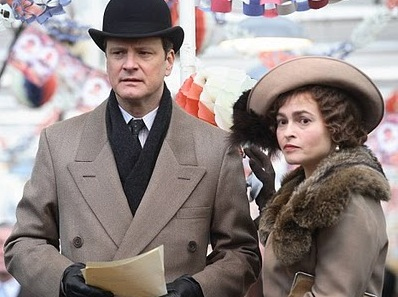The King’s Speech
Posted on April 18, 2011 at 8:00 am
A-| Lowest Recommended Age: | Middle School |
| MPAA Rating: | Rated R for language |
| Profanity: | One brief scene with profanity used as a vocal exercise |
| Alcohol/ Drugs: | Social drinking, smoking |
| Violence/ Scariness: | None |
| Diversity Issues: | Class difference |
| Date Released to Theaters: | December 17, 2010 |
One of the best movies of the year makes a king look like an underdog in the true story of a man who had to literally and metaphorically find his voice, with in a very real sense the fate of the world depending on it.
 It wasn’t because she didn’t love him, she explains, when she turned down his proposal of marriage twice. It was because he was a prince, a member of the British royal family, and she did not want to live a public life. And then she remembered that she did love him. And that he had a stammer, so she concluded that would keep him on the sidelines. And then she married him, and they had two children. And then he became king.
It wasn’t because she didn’t love him, she explains, when she turned down his proposal of marriage twice. It was because he was a prince, a member of the British royal family, and she did not want to live a public life. And then she remembered that she did love him. And that he had a stammer, so she concluded that would keep him on the sidelines. And then she married him, and they had two children. And then he became king.
The Duke of York (Colin Firth), known as Bertie to his family, was an almost-ideal second son in the royal family. He served honorably in the military and took his public duties seriously. He had no interest his brother David’s position as the heir to the throne. But then three things happened. First, radio was invented, and all of a sudden a dignified wave was not enough. For the first time, all of Great Britain (encompassing, at that time, one quarter of the developed world) could hear the voice of their leaders. Second, Hitler’s aggression was making war inevitable.
And third, Bertie’s brother David, by then King Edward VIII, would shatter precedent and become the first ruler in British history to resign, in royal terms, to abdicate, so that he would be free to marry an American divorcee named Wallis Simpson. Just at the moment when the British people most needed to hear their king, they had a king who could not  speak.
speak.
The best doctors had been consulted, and Bertie had been subjected to treatment that literally went back to Demosthenes. And then the Duchess brought him to Lionel Logue (Geoffrey Rush), an Australian actor who had worked with the shell-shocked veterans of WWI. As an actor, he knew breathing techniques and other exercises to help make the spoken word smooth and compelling. And his work with the veterans showed him that the relationship between the therapist and the stutterer — and sometimes the opportunity to talk about the stutterer’s experiences and fears — could be very important.
And so Bertie has, for the first time ever, conversations with someone outside his family. He desperately wants to maintain his dignity, but he even more desperately wants to be able to play this increasingly more crucial role.
The movie may be sepia tones and British accents but it is not at all stuffy thanks to Firth, Rush and Helena Bonham Carter as his wife. Firth shows us Bertie’s struggles to locate his voice and define his role. In one scene, when he tells his little girls (including the current Queen Elizabeth) a bedtime story, it is almost unbearably touching because it means so much to him and the story is so self-deprecatory and loving. People who have trouble speaking spend a lot of time listening and observing. Bertie watches his father and brother with deference, a need for approval, and also a thoughtful evaluation of their strengths and weaknesses as though he is measuring them as a way of creating himself.
The heart of the film is Bertie’s meetings with Lionel, and they are a marvel. Screenwriter David Seidler, himself a one-time stutterer whose uncle was treated by Lionel, worked on the screenplay for decades (the Queen Mother asked that it not be produced until after her death), and it is a masterwork that merits all that went into it. At age 72, Seidler knows what it is to find one’s voice.

